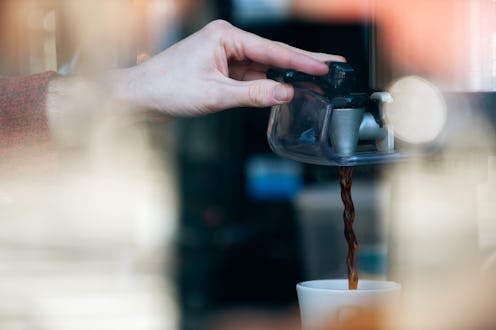News
A California Judge Ruled That Coffee Must Come With A Cancer Warning & This Is Why

If you live in California, having your morning cup of joe might soon start making you feel like you're living on the edge. Because of a decision that California Superior Court Judge Elihu Berle just passed down, your coffee will soon come with a cancer warning plastered on the side of the cup. Despite the wide variety of studies on coffee's effect on human health, society's favorite energy booster will now join fellow vices cigarettes and alcohol in the ranks of favorite consumables carrying frightening warnings.
This all comes back to a lawsuit that the Council for Education and Research on Toxics filed eight years ago against Starbucks, Peet's Coffee, and numerous other purveyors of fine coffee operating in California. They took issue with the presence of a known carcinogen statistically present in every cup of coffee poured: acrylamide. That compound first showed up on the list of known carcinogens in 1990, but research only showed that it turned up in coffee and various other cooked foods (including french fries, potato chips, and bread) in 2012.
The thing about acrylamide, though, is that according to the Washington Post, it's still unclear if it actually does cause cancer in humans, and if so, how much of a risk your morning caffeinated (or decaffeinated, if that's your thing) beverage actually poses.
According to research from the American Cancer Society cited in the Post, acrylamide caused cancer in rats and mice when the animals drank water with acrylamide levels 1,000 to 10,000 times what people run into in their food or drink. Studies with people haven't shown any sort of causal link between acrylamide and any particular variety of cancer in humans, especially when it comes to acrylamide specifically present in food. It's also present — at higher rates than in coffee — in tobacco smoke. It's also hard to pin down exactly how much people are getting exposed to the compound from any given source, since researchers have to rely on what people report about their diets.
Still, the defendants in the coffee lawsuit were claiming not only that acrylamide present in coffee wasn't there at a high enough level to be harmful, but also that drinking coffee provided enough of a health benefit that it outweighed any risk posed. Judge Berle, however, ruled that they had failed to do so.
“While plaintiff offered evidence that consumption of coffee increases the risk of harm to the fetus, to infants, to children and to adults, defendants’ medical and epidemiology experts testified that they had no opinion on causation,” Berle wrote in his ruling. “Defendants failed to satisfy their burden of proving by a preponderance of evidence that consumption of coffee confers a benefit to human health.”
If that sounds like a slightly confusing ruling, it's because it's based on a confused data set. No one doubts the presence of acrylamide in coffee, so that fuzzy connection between coffee and cancer does exist. However, you can basically find a study claiming whatever you want to find about the connection between coffee and health.
A recent systematic review of all recent studies on the connection between coffee and all sorts of health issues found that coffee is, in fact, good for you. Various studies included in that analysis have shown that coffee could lower your risk for breast, colorectal, colon, endometrial, and prostate cancers; heart disease; Parkinson's disease; Type 2 diabetes; and early death. Still, though, none of those were decisive, instead only offer a "probable" link between coffee and those risk reductions. Another massive review, then, offered the conclusion that you can drink coffee in peace knowing that it is neither good nor bad for your health.
The only question remaining in the case is whether the defendants will have to settle and for what amount, because the council bringing the lawsuit was asking for some pretty hefty fines. All that matters for your purposes, though, is that when you buy a coffee in California, you're now going to get a little reminder that there just might be something unpleasant lurking in your cup. While there's a good chance that it won't give you cancer, you can be sure that it will wake you up.